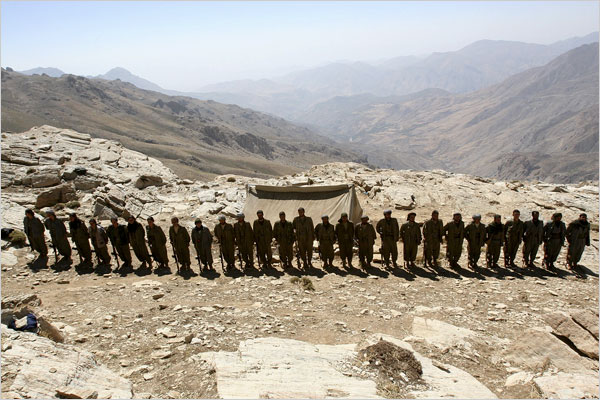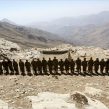
Iran’s Kurdish Militants Under Pressure from Joint Turkish-Iranian Assaults
Publication: Terrorism Monitor Volume: 6 Issue: 21
By:

Until recently, the Party for Free Life in Kurdistan (Parti Jiyani Azadi Kurdistan – PJAK), an armed Kurdish separatist group active in Iran, was beginning to emerge as a genuine military irritant to Iran’s government, killing in excess of 100 Iranian security forces per year while building support for its goal of regional autonomy among Iran’s estimated 7 million Kurds. In the last three months, however, PJAK’s military attacks on Iranian targets have dramatically tailed off. This coincides with a joint Iranian-Turkish offensive against PJAK’s main base in the Qandil Mountains, which the group shares with the Kurdistan Workers Party (Partiya Karkeren Kurdistan – PKK), a larger Turkish-based Kurdish guerrilla group. PJAK has sought to adapt to this military offensive and other developments by re-branding the group as a secular, democratic, and primarily non-violent movement struggling against Iranian tyranny. It has also stepped up its grassroots activism in Iranian Kurdistan and adopted other non-violent forms of protest and resistance in order to expand and strengthen its support base. At the same time, however, the group has sought to re-affirm its commitment to armed struggle and to strengthen its alliance with the PKK.
PJAK Military Activity Declines
Only two attacks by PJAK against targets in Iran were reported in October. On October 17, PJAK members killed a member of the Revolutionary Guards in Zanjan province in Iranian Kurdistan. The attack came a week after the group killed two other members of the Iranian security services (Iranian Student’s News Agency, October 17). At around the same time, on October 11, four PJAK members were reported to have been killed in a clash with members of Iran’s Basiji religious militia near the city of Marivan (Press TV, October 11). This is almost the only military activity reported by PJAK in the last three months. By comparison, PJAK claimed to have killed 51 Iranian troops in July alone (pjak.org, August 6). While PJAK attacks have tailed off since summer, the PKK has used this autumn to carry out some of its largest and most successful operations in years, most notably its attack on the Turkish army’s outpost at Aktutun in early October, which killed 17 Turkish soldiers (see Terrorism Focus, October 30). The contrast between the PKK’s high-profile, though often costly successes and PJAK’s comparative inactivity in recent months is all the more striking when one considers that the Turkish army is much better trained, equipped, and led than the Iranian forces targeted by PJAK.
Turkish/Iranian attacks
One reason for the decrease in PJAK’s attacks is the increasingly regular bombardments by Turkish aircraft and Iranian artillery of the group’s main headquarters in the foothills of the Qandil Mountains on the Iraqi-Iranian border. Although PJAK and the PKK occupy entirely different parts of Mount Qandil, a complex series of interlocking mountains reaching to heights of around 3,000 meters, the Turkish air force has repeatedly struck PJAK targets as well as those of the PKK. These air-strikes have caused limited PJAK casualties. For example, on October 17, PJAK reported that four of its members had died in a Turkish air strike earlier that day (Firat news agency, October 17). A press release issued by PJAK the same day said that the four members killed were all new recruits and that a total of 12 PJAK members had now died in the attacks on Qandil (pjak.org, October 17). However, the damage caused to PJAK’s logistical and organisational abilities may be greater than these numbers suggest. The Qandil Mountains serve as a training grouind for new Iranian Kurdish recruits as well as a hub for its propaganda activities. For example, according to the same press release, PJAK said that their “media center” was among the facilities hit in the latest Turkish air-raids. The effect of these attacks on PJAK’s morale is harder to estimate. By comparison, the Turkish army has said it believes its air-attacks on the PKK have badly damaged the group’s morale, estimating recently that over 120 PKK members had left the group in the previous few weeks (Hurriyet, October 31). Despite this, the PKK, unlike PJAK, has increased its attacks in the months following the first Turkish air attacks. One reason why the PKK may be relatively less affected by the bombardments than PJAK is that the group has long maintained a range of other centers and training grounds around Iraqi Kurdistan. By contrast, nearly all of PJAK’s assets in Iraqi Kurdistan are believed to be located in the camps in Qandil.
The Turkish-Iranian Alliance
The Turkish air attacks on PJAK are the result of a rapidly deepening military, political, and economic alliance between Turkey and Iran – as symbolized by the August 2008 meeting in Istanbul between Iranian President Mahmoud Ahmadinejad and Turkish President Abdullah Gul (Eurasia Daily Monitor, October 20). Theocratic Iran and officially secular Turkey might not seem like natural allies. However, the two countries, while both strongly nationalistic, have no territorial claims against each other and share a common fear of Kurdish nationalism in all its forms, a fear that overrides religious or ideological considerations. But while this alliance has been deepening for some years, Iranian-Turkish military co-operation has only come of age in 2008. In June, General Ilker Basbug, then commander of Turkey’s land forces, told journalists, "We are sharing intelligence with Iran, we are talking, we are coordinating … When they start an operation, we do too. They carry out an operation from the Iranian side of the border, we from the Turkish side" (CNN-Turk, June 5, see also Terrorism Focus, June 24). Such statements now seem to be confirmed by PJAK. For example, PJAK’s October 17 press release reported that U.S. planes had carried out reconnaissance flights over Mount Qandil two days before the raid and the subsequent Turkish air-raids were accompanied by Iranian artillery bombardments from nearby Iranian bases. PJAK said that it saw this not only as evidence of Iranian-Turkish co-operation but also as proof that Turkey was sharing U.S. intelligence with the Iranian military. The deepening Iranian-Turkish alliance has also led to increased diplomatic pressure being put on Iraqi Kurdish leaders. For example, Massoud Barzani, the head of the Kurdish Regional Government in Iraq, has recently received Turkish delegations concerned about the PKK, while also meeting Ahmadinejad in Tehran in October (Today’s Zaman, October 24). To date, however, Barzani has avoided taking effective action against the PKK or PJAK, claiming it is impossible for the Kurdish government, either militarily or politically.
PJAK’s Response
PJAK has sought to adapt to these military and political developments by re-branding itself internationally as a secular and primarily non-violent group that is only seeking to stand up to Tehran’s authoritarian Islamic rule. For example, a statement posted in English on the group’s website drew attention to the imprisonment, torture, and execution of Kurdish activists in Iran and said that the Iranian government has "tracked down and persecuted all political and civil activists, along with liberal and democratic intellectuals, to create an atmosphere of extreme fear and terror among the people” (pjak.org, September 5). The statement appealed to “democratic forces all over the world to stand up with the Kurdish and Iranian people in their struggle for freedom, democracy, and peace.” Simultaneously, PJAK appears to have stepped up its attempts to expand its support base among Iran’s Kurds. For instance, on August 25 PJAK organised a 45-day hunger strike by Kurdish political prisoners held in Iranian jails (pjak.org, October 1). On September 3, PJAK also organized a general strike by shopkeepers in Iranian Kurdistan in support of the prisoners. However, Kurdish media reported the strike lasted only a few hours before Iranian security forces began forcing shops to open for business (Kurdish Globe, September 3). PJAK has also recently re-affirmed its support for the PKK and the principle of armed struggle, even issuing an ambiguous promise to start attacking the Turkish military. On September 3, Amed Piran, a senior PJAK commander, said the recent air attacks prove that the "Turkish state and its army [have] decided on a comprehensive war against the Kurdish Freedom Movement and the Kurdish people,” and that as a result PJAK considers “the Turkish state and its army as our primary enemy … We will organize our forces, which are actively in the war, against the TSK [Turk Silahli Kuvvetleri – the Turkish Armed Forces]" (Firat News Agency, October 3). To date, however, there is no evidence of PJAK carrying out attacks against Turkish forces – either in Iraqi Kurdistan or in Turkey itself.
Conclusion
It seems likely that recent coordinated Iranian and Turkish strikes on PJAK’s main headquarters in the Qandil Mountains have badly hurt the group’s ability to attack targets inside Iran. Although the group still carries out operations against targets in Iran, the tempo of such attacks is much reduced. This contrasts with the PKK, which seems to have been spurred to new levels of militant activity by the Turkish airstrikes. In response to these attacks and the growing diplomatic pressure being put on Iraq’s Kurds, PJAK has re-focused its activities on building support among the Kurdish minority in Iran. If successful, this will make the group relatively immune from all but the most severe Iranian crackdown, as well as make the group less vulnerable to Iraqi, Kurdish, Turkish, or U.S. pressure. Greater support from Iran’s ethnic Kurdish community would also decrease the group’s dependence on the PKK. At the same time, however, the group has issued threats against the Turkish military, perhaps in an attempt to reassure its more hard-line supporters or to temporarily shore up its alliance with the PKK. This dangerous stratagem not only risks provoking more Turkish air attacks but also threatens to undermine any international support or sympathy for PJAK and its objectives.




